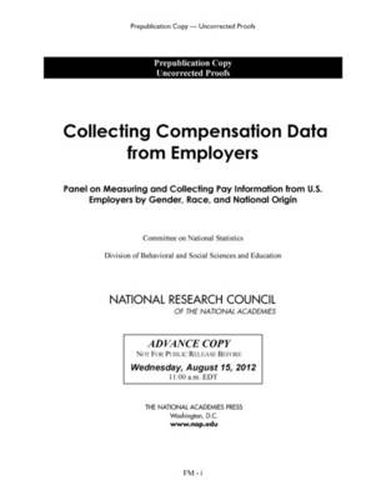Readings Newsletter
Become a Readings Member to make your shopping experience even easier.
Sign in or sign up for free!
You’re not far away from qualifying for FREE standard shipping within Australia
You’ve qualified for FREE standard shipping within Australia
The cart is loading…






U.S. agencies with responsibilities for enforcing equal employment opportunity laws have long relied on detailed information that is obtained from employers on employment in job groups by gender and race/ethnicity for identifying the possibility of discriminatory practices. The U.S. Equal Employment Opportunity Commission (EEOC), the Office of Federal Contract Compliance programs of the U.S. Department of Labor, and the Civil Rights Division of the U.S. Department of Justice have developed processes that use these employment data as well as other sources of information to target employers for further investigation and to perform statistical analysis that is used in enforcing the anti-discrimination laws. The limited data from employers do not include (with a few exceptions) the ongoing measurement of possible discrimination in compensation. The proposed Paycheck Fairness Act of 2009 would have required EEOC to issue regulations mandating that employers provide the EEOC with information on pay by the race, gender, and national origin of employees. The legislation was not enacted. If the legislation had become law, the EEOC would have been required to confront issues regarding currently available and potential data sources, methodological requirements, and appropriate statistical techniques for the measurement and collection of employer pay data. The panel concludes that the collection of earnings data would be a significant undertaking for the EEOC and that there might be an increased reporting burden on some employers. Currently, there is no clearly articulated vision of how the data on wages could be used in the conduct of the enforcement responsibilities of the relevant agencies. Collecting Compensation Data from Employers gives recommendations for targeting employers for investigation regarding their compliance with antidiscrimination laws.
$9.00 standard shipping within Australia
FREE standard shipping within Australia for orders over $100.00
Express & International shipping calculated at checkout
U.S. agencies with responsibilities for enforcing equal employment opportunity laws have long relied on detailed information that is obtained from employers on employment in job groups by gender and race/ethnicity for identifying the possibility of discriminatory practices. The U.S. Equal Employment Opportunity Commission (EEOC), the Office of Federal Contract Compliance programs of the U.S. Department of Labor, and the Civil Rights Division of the U.S. Department of Justice have developed processes that use these employment data as well as other sources of information to target employers for further investigation and to perform statistical analysis that is used in enforcing the anti-discrimination laws. The limited data from employers do not include (with a few exceptions) the ongoing measurement of possible discrimination in compensation. The proposed Paycheck Fairness Act of 2009 would have required EEOC to issue regulations mandating that employers provide the EEOC with information on pay by the race, gender, and national origin of employees. The legislation was not enacted. If the legislation had become law, the EEOC would have been required to confront issues regarding currently available and potential data sources, methodological requirements, and appropriate statistical techniques for the measurement and collection of employer pay data. The panel concludes that the collection of earnings data would be a significant undertaking for the EEOC and that there might be an increased reporting burden on some employers. Currently, there is no clearly articulated vision of how the data on wages could be used in the conduct of the enforcement responsibilities of the relevant agencies. Collecting Compensation Data from Employers gives recommendations for targeting employers for investigation regarding their compliance with antidiscrimination laws.